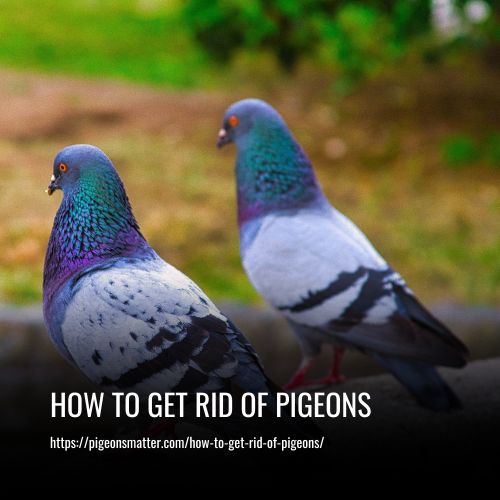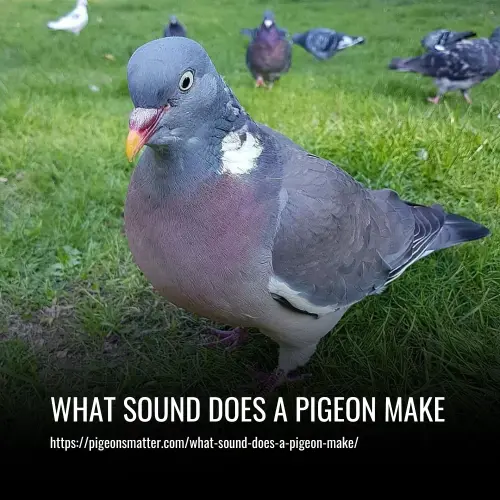Pigeons are a common sight in urban areas, but they can quickly become a nuisance. They leave droppings everywhere, damage buildings, and carry diseases. If you’re dealing with a pigeon problem, you’re probably wondering how to get rid of them. The good news is that there are many effective ways to get rid of pigeons.
To Get Rid Of Pigeons, Follow These Steps:
- Remove Pigeons’ Food Sources
- Stop Pigeons Nesting
- Repel Pigeons
- Call In A Professional

How To Get Rid Of Pigeons
There are several options available when it comes to getting rid of pigeons.
1. Remove Pigeons’ Food Sources
One of the best ways to prevent them from sticking around is to remove their food sources. Biologist and training specialist, Thomas Ward, recommends eliminating any potential sources of food and not feeding them.
This means making sure that your trash cans, recycling bins, and compost bins are secure and not accessible to pigeons. Also, remember to clean up any outdoor meal scraps and make sure that pet food is not accessible to pigeons. By removing their food sources, you can also deter rats and get rid of mice. It’s a simple and effective way to prevent pigeons from becoming a problem.
2. Stop Pigeons Nesting
Pigeons can be a nuisance when they decide to nest in residential or commercial areas. According to Thomas Ward, the main issue arises when pigeons roost on ledges, roofs, chimneys, attics, sheds, and barns. In such cases, it is important to remove the nest. To prevent pigeons from landing and perching, a variety of products can be used, including bird slopes and spikes.
These spikes can deter birds from landing on surfaces and scouting for nesting spots. Netting with a half-inch mesh can also be used to prevent pigeons from accessing specific locations.
Additionally, pruning trees with dense branches and leaf covers may help modify the habitat to discourage pigeons, although this may not always be effective as pigeons often prefer manmade structures for nesting and roosting.
3. Repel Pigeons
If you’re dealing with a pigeon problem, there are several solutions available to repel them. One option is an optical gel, which is made from citronella, peppermint oil, agar, and beeswax. Pigeons do not like the smell of citronella or peppermint oil, and the gel creates a sight disturbance and a sticky texture that they won’t want to touch. This humane option is more aesthetically pleasing than bird spikes and can be used after cleaning the area to remove bird pheromones.
Another option is an ultrasonic deterrent, which emits a sound that humans cannot hear but is jarring to birds. These devices are small and can be placed anywhere, and solar-powered options are available for low maintenance.
Wind chimes can also be effective, as the sound can ward off unwanted visitors, and some chimes have reflective objects that discourage pigeons from staying. Reflective surfaces like CDs or motion-activated lights, scare tape, and reflective spiral stickers can also deter birds, but pigeon-repellent gels are a short-term solution that requires reapplication.
4. Call In A Professional
Dealing with a large flock of pigeons can be a daunting task, and it may require the assistance of a professional. In such cases, it’s best to call in a trained expert who can help you get rid of the birds safely and effectively.
How Do Professionals Keep Pigeons Off Your Roof
If you’re dealing with a pigeon or bird infestation, there are several effective bird control solutions available. Here are some options to consider:
1. Bird netting
This method involves using nets of various sizes to prevent birds from colonizing certain areas of a building. Applying this technique can provide protection to various architectural features, including building fascias, flat roofs, balconies, statues, and other decorative elements that may be susceptible to bird damage.
2. Bird spikes
These are effective and humane solutions for preventing birds from nesting on linear surfaces. They can be installed on ledges, window sills, and other areas where birds might try to perch.
3. Bird wire
Also known as anti-pigeon wire, this solution is ideal for larger buildings like cathedrals and banks. It offers a discreet way to eliminate bird infestations without impacting the visual appeal of the building.
4. Electric bird deterrent system
This method is best suited for heavily colonized buildings. A discreet system measuring just 8mm is installed, and birds receive a small shock when they land on the building. This doesn’t harm the birds, but it encourages them to look for other places to perch.
It’s important to choose a bird control solution that’s appropriate for your specific situation. Consider the size of your building, the type of birds you’re dealing with, and the areas that need to be protected. With the right strategy in place, you can effectively manage any bird infestation and protect your property from damage.
Dangers And Property Damage Related To Pigeons
Pigeons may seem like harmless birds, but they can actually pose several problems and risks to both humans and property. Here are some of the reasons why you may want to consider pigeon control methods:
1. Diseases
Pigeons are known to transmit various parasites and diseases through their droppings and dust. These include E.coli, Histoplasmosis, Psittacosis, Cryptococcosis, and more.
2. Droppings
Pigeons leave a large number of droppings that are highly acidic and corrosive. They can stain surfaces, increase the deterioration of structures, and even damage cars and awnings. Once the droppings dry, they can also be used to reinforce nests.
3. Debris
Pigeons are known to shed a significant amount of feathers and disperse nesting materials throughout their surroundings. This can quickly build up and clog gutters, eaves, and air vents.
4. Other pests
Pigeons have the potential to spread vermin species, including ticks, bed bugs, lice, and bird mites. Even if the birds leave the nest, the insects may still remain and cause problems.
5. Noise
Pigeons’ cooing can be loud and disruptive, especially early in the morning.
6. Nuisance to gardeners
Pigeons can damage crops, plants, and produce in search of food. They can also scare off other birds and wildlife from feeders.
If you are experiencing any of these issues, it may be time to consider pigeon control methods to protect your property and health.
What Attracts Pigeons to Buildings in the First Place
Pigeons have been a part of human history for centuries, serving as message carriers, a source of food, and entertainment. Due to this long relationship, they have lost their fear of humans, which is why they often nest in or around our homes. Pigeons tend to be drawn to locations that provide safety and a reliable food supply, enabling them to form flocks and establish nests.
These birds are not selective in their food choices and will consume both processed food and bird seed. Due to the lack of natural predators, pigeon nests are easily visible in the environment.
If you want to deter pigeons from your property, note that harming them, their nests (while occupied), or their eggs is illegal according to the Wildlife & Countryside Act from 1981. You can either deal with the problem yourself or hire a professional, but you will be held responsible for the means of control used.
Tips To Keep Pigeons Off Your Home
1. Make roosting areas unappealing
If you’re dealing with a pigeon infestation, there are several steps you can take to deter them from landing and nesting on your property.
1. Install anti-roosting spike strips on window sills and ledges to make landing uncomfortable for the pigeons.
2. A possible neutral tone of voice for this sentence could be: To prevent pigeons from roosting, it is recommended to tie a string one inch above their nesting areas to create an uncomfortable landing surface.
3. Install sloping covers on window sills and ledges to prevent flat surfaces for the pigeons to balance and build nests on.
4. Don’t feed the pigeons as this will attract them and others to your property.
5. Get rid of other food sources, such as trash, and open vegetable gardens, to prevent the pigeons from flocking to your property.
By implementing these steps, you can effectively deter pigeons and prevent them from causing damage to your property.
2. Seal all possible entry points
If you’re concerned about pigeons nesting in or around your home, there are several steps you can take to exclude them. It’s important to be attentive to areas such as eaves and attics as they are frequently used as nesting spots. Here are some effective tactics:
3. Seal openings in your attic
If there are any gaps or holes that pigeons could use to get inside, seal them up completely or install a metal wire mesh to keep them out.
4. Cap your chimney
Pigeons are known for nesting in chimneys, which can cause blockages and even lead to birds getting trapped and dying inside. Installing a metal wire cage over your chimney can prevent this from happening.
5. Use mesh or netting
Pigeons may attempt to construct nests on the trays below air conditioning units. Surrounding these areas with mesh or netting can keep them out.
6. Call in the professionals
If you’ve tried all these tactics and still can’t get rid of the pigeons, it may be time to call in the experts. A pest control company like Fantastic Pest Control can safely and humanely remove the birds from your property.
By taking these steps, you can effectively exclude pigeons from your home and prevent them from causing damage or creating a nuisance.
How To Keep Pigeons Off The Balcony
There are several methods to keep pigeons off your balcony, including:
1. Install bird spikes: These are plastic or metal spikes that prevent birds from landing on your balcony.
2. Use bird netting: This is a physical barrier that prevents birds from entering your balcony.
3. Scare them away: You can use visual or auditory deterrents, such as shiny objects or loud noises, to scare pigeons away.
4. Use repellents: There are several pigeon repellents available on the market, such as sprays or gels, that can discourage pigeons from landing on your balcony.
5. Keep your balcony clean: Pigeons are attracted to food and water sources, so make sure to keep your balcony free of any food scraps or standing water.
How To Deter Pigeons From Your Garden
If you are a gardener, you may have experienced the frustration of pigeons eating your plants or fruit. To protect your garden from these feathered pests, there are several bird deterrents you can try.
Using a hose to spray the pigeons can be an effective deterrent if you catch them early. Alternatively, you can invest in an automatic water jet to protect your garden perimeter.
Scarecrows can also be effective, especially those with the silhouette of a hawk that moves and makes noise. However, you will need to move the decoy regularly to prevent the pigeons from realizing it is not a real threat.
Reflective surfaces, such as CDs, can produce a prism effect that has a temporary impact on pigeons’ eyesight and discourages them from your garden. If you have sheds or other garden constructions, consider installing bird netting to protect them without harming the birds.
Lastly, if you have bird feeders, beware of the “bully bird” pigeon that will scare off smaller birds and steal their food. Keeping these intruders away altogether is the best option for bird peace in your garden.
Home Remedies To Get Rid Of Pigeons – Do They Work?
Various natural remedies can be utilized to remove pigeons if necessary. Keep in mind that these methods may not be effective on their own, but can be used in combination with other tactics to discourage pigeons from nesting on your property.
One option is to use a honey solution. While we previously advised against providing a food source, birds do not like landing on sticky surfaces. You can spread honey on roof ledges or balconies to keep pigeons away, but be aware that this may attract other unwanted visitors like wasps, ants, and flies.
Another option is to use strong spices. Studies have shown that pigeons avoid consuming strong spices like black pepper, chili, and cinnamon. To deter them from popular nesting areas, spice bags or spread spices can be utilized. It is important to note that regular replacement is necessary to maintain their effectiveness.
Having pets can also discourage pigeons from nesting. Having a pet at home may help to deter pigeons as they tend to dislike dogs and cats. Bird nets are a humane bird deterrent that can be effective. Once pigeons realize they get trapped every time they visit your home, they will quickly move on. However, you must check the nets regularly and release any caught pigeons.
Finally, you can try using fake predators. One way to deter pigeons from landing on your balcony, patio, deck, or roof is by purchasing a life-size plastic owl or snake. An automated toy that moves can be even more effective.
How To Get Rid Of Pigeons But Not Other Birds
If you’re looking to deter pigeons from your property, it’s important to be aware of the methods that can do harm to beneficial birds, other wildlife, and your pets. Here are some methods to avoid:
Ultrasonic devices use sound waves to confuse pigeons and drive them away. While this technology is effective in agriculture, it can harm other birds, cats, and dogs. Additionally, it is a temporary solution and does not prevent pigeons from returning once the device is turned off.
Gel repellents create a sticky film that prevents pigeons from perching on your roof. However, these gels can weather out and need to be reapplied. It is important to use an environmentally-friendly product that is not a polybutylene gel, as this type of gel can harm birds by getting stuck on their feathers and preventing them from flying.
When deterring pigeons, it is important to consider the impact on other wildlife and pets. Choose methods that are effective and safe for all animals involved.
FAQs
Having a dog or cat may assist with the bird issue to some degree, but the birds are unlikely to be deterred as they have a height advantage over domestic animals.
The installation of a scarecrow in either the front or back garden can be compared to the use of a bird of prey decoy. However, its effectiveness is minimal, especially once the birds become accustomed to it.
An increase in pigeons on your roof may indicate a nearby food and water source. To remove pigeons, it’s important to eliminate these sources and avoid feeding them. Pigeons enjoy grass seeds, berries, and pet food. Consider replacing fruit trees with fern, oak, pine, or maple trees and keeping pet food indoors. Pigeons may also be attracted to access points in your attic, which provide a safe and warm breeding ground.
Thomas Ward proposes the use of grape-scented misting or wicking products as a means of deterring pigeons as a bird repellent. Darren Backhouse cautions that spices such as chili and cinnamon may offer only short-term relief. Citronella and peppermint oil are additional scents that are believed to deter pigeons, as well as wasps and mosquitoes.
It’s important to know when it’s time to call in the professionals for bird control. If you’ve tried home remedies and they’re not working, it’s time to seek help. Pest Defence provides effective solutions for preventing pigeons from causing damage and mess on your property. Don’t hesitate to reach out to your local pest controllers for help with bird control.
Conclusion
As you can see, getting rid of pigeons can be a challenging task, but it’s not impossible. With the right strategy, tools, and persistence, you can keep these pests away from your property and enjoy a clean and safe environment.
Remember to take a humane approach and avoid using harmful methods that could harm the birds or other animals. By following the tips outlined in this article, you’ll be able to get rid of pigeons and prevent them from coming back.



